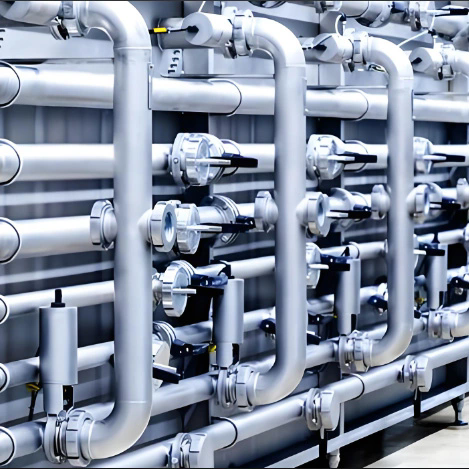How Does a Liquid Cooling Rack Manifold Pipe Enhance Data Center Efficiency?
2025-09-08
In the era of high-performance computing, artificial intelligence, and cloud storage, the demand for powerful servers and data centers is growing exponentially. However, as processing power increases, so does heat generation, making thermal management a critical concern. Traditional air-cooling systems are no longer sufficient to meet the energy efficiency, density, and sustainability requirements of modern data centers. This is where liquid cooling rack manifold pipes come into play — a cutting-edge solution designed to manage high heat loads effectively while optimizing space and performance.
What Is a Liquid Cooling Rack Manifold Pipe and How Does It Work?
A liquid cooling rack manifold pipe is a specialized distribution system designed to circulate coolant efficiently within server racks. Unlike traditional air-based cooling, which uses fans to push cold air through racks, a manifold pipe delivers a continuous flow of liquid coolant directly to the heat-generating components such as CPUs, GPUs, and memory modules. The heat is absorbed by the coolant and transported away from the hardware, maintaining optimal operating temperatures even under heavy workloads.
Working Principle
-
Coolant Distribution – The manifold pipe connects to the facility’s primary cooling loop, distributing coolant evenly across multiple server nodes.
-
Heat Absorption – Direct-to-chip cold plates or immersion cooling blocks transfer heat from critical components into the coolant.
-
Return Path – Heated coolant flows back through the manifold pipe to the central cooling system or heat exchanger for re-circulation.
-
Efficient Regulation – Integrated flow control valves and sensors ensure balanced flow rates and prevent overcooling or hotspots.
Why It Matters
-
Higher Density Support – Enables high-density rack configurations without overheating.
-
Energy Savings – Reduces reliance on power-hungry air conditioning systems.
-
Scalability – Supports modern data center expansion without significant redesign.
-
Sustainability – Improves Power Usage Effectiveness (PUE) and reduces carbon footprint.
Why Choose a Liquid Cooling Rack Manifold Pipe for Data Centers?
The choice of cooling technology has a direct impact on performance, reliability, and operational costs. A liquid cooling rack manifold pipe offers several distinct advantages over conventional air cooling.
Key Benefits
-
Exceptional Heat Dissipation – Liquid has a thermal conductivity nearly 3,500 times higher than air, enabling rapid heat transfer.
-
Space Optimization – Eliminates the need for bulky air ducts and fans, allowing tighter rack configurations.
-
Reduced Downtime – Prevents thermal throttling, which can degrade performance and cause unexpected shutdowns.
-
Noise Reduction – Significantly quieter than fan-driven cooling systems.
-
Future-Proof Design – Handles next-generation processors and GPUs with ultra-high Thermal Design Power (TDP).
Product Specifications
| Specification | Details |
|---|---|
| Material | High-grade stainless steel / copper alloy |
| Coolant Type | Water, glycol mixture, or dielectric fluid |
| Temperature Range | -20°C to +85°C |
| Maximum Flow Rate | Up to 30 L/min per manifold |
| Pressure Tolerance | Up to 10 bar |
| Rack Compatibility | 19-inch and 21-inch server racks |
| Connector Options | Push-to-connect, threaded, and quick-release |
| Leak Protection | Double O-ring seals and safety valves |
| Certification | RoHS, CE, ISO 9001 compliant |
These specifications make liquid cooling rack manifold pipes adaptable for various cooling strategies, including direct-to-chip liquid cooling, rear-door heat exchangers, and immersion cooling systems.
How Liquid Cooling Rack Manifold Pipes Improve Operational Efficiency
As computing power scales, so do the challenges of maintaining optimal thermal conditions. Implementing manifold-based liquid cooling delivers several operational advantages that translate into measurable business benefits.
a) Lower Energy Consumption
Liquid cooling significantly reduces the energy required for cooling compared to air-based systems. By transporting heat directly away from high-density racks, manifold pipes enable facilities to achieve Power Usage Effectiveness (PUE) ratings as low as 1.1, compared to 1.6 or higher for traditional setups.
b) Increased Rack Density
With efficient liquid cooling, operators can safely deploy densities exceeding 60 kW per rack, allowing more servers to be installed per square meter. This is especially valuable for hyperscale data centers and high-performance computing (HPC) clusters.
c) Enhanced Equipment Lifespan
Consistent temperature control minimizes component stress caused by thermal fluctuations, extending the lifespan of critical hardware components and reducing replacement costs.
d) Sustainability and Environmental Impact
Liquid cooling uses less energy and can integrate with free-cooling systems, geothermal loops, and heat reuse technologies. This reduces greenhouse gas emissions and helps organizations meet sustainability targets.
FAQs About Liquid Cooling Rack Manifold Pipes
Q1: How does a liquid cooling rack manifold pipe prevent leaks?
A1: Modern manifold pipes incorporate double O-ring seals, quick-release couplings, and pressure sensors to minimize the risk of leaks. Additionally, manufacturers conduct rigorous pressure tests to ensure long-term reliability even under demanding conditions.
Q2: Is liquid cooling safe for high-density data centers?
A2: Yes. In fact, liquid cooling is specifically designed for high-density environments where air cooling becomes insufficient. The use of non-conductive dielectric coolants further enhances safety by eliminating the risk of electrical shorts.
Upgrade to Smarter Cooling with Shuangsen
As modern data centers push the boundaries of computing power, traditional air-based cooling systems are no longer enough. A liquid cooling rack manifold pipe offers a reliable, efficient, and scalable solution that improves thermal management, optimizes operational costs, and supports sustainability goals.
At Shuangsen, we specialize in precision-engineered manifold pipes designed for seamless integration with your existing infrastructure. Our solutions are built with high-quality materials, advanced safety features, and superior thermal performance, ensuring your data center remains competitive in an energy-conscious world.
Ready to take your data center cooling to the next level?
Contact us today to learn more about our liquid cooling solutions and customized manifold pipe systems.



